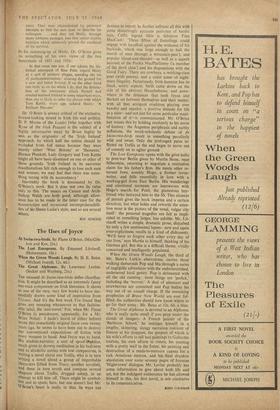The Uses of Joyce
The Great Alphonse. By Lawrence Levine. (Seeker and Warburg, 21s.)
THE reissued At Swim-two-birds defies classifica- tion. It might be described as an extremely funny One-man symposium on Irish literature. It shows as one of the very, very few books to have suc- cessfully drawn some kind of inspiration from Ulysses. And it's the first work I've found that gives any meaning whatsoever to that fashion- able label, the 'anti-novel.' For, when Mr. Flann O'Brien (a pseudonym, apparently, for a Mr. Brian Nolan: I hadn't heard of either before) Wrote this remarkably original farce over twenty Years ago, he seems to have been out to destroy our conventional expectations of fiction with every weapon to hand. And Joyce was to hand. His student-narrator, a sort of spoof-liedalus, much given to drowsy meditation in his bedroom and to alcoholic sorties with low companions, is Writing a novel about one Trellis, who is in turn writing a novel about a group of improbable characters (lifted from Tracy, another novelist), and these in turn revolt and compose several chapters about Trellis, drugged asleep, in an attempt to kill him off. There might be symbol- ialn and to spare, here, but one doesn't feel Mr. O'Brien's heart is really in that. In ways too devious to report, he further enlivens all this with some disturbingly accurate pastiches of bardic lays, Celtic legend (this is fabulous Finn MacCool : 'Three fifties of fosterlings could engage with handball against the wideness of his backside, which was large enough to halt the march of men through a mountain-pass'), and popular blood-and-thunder--as well as a superb account of the Pooka MacPhellimey ('a member of the devil class') and his disputations with the Good Fairy. There arc cowboys, a working-class poet (with poems), and a court scene of night- mare illegality. Notoriously, Irish humour has its black, satiric aspects. Swift came down on the side of his abstract Houyhnhnms; and some- where in the distances that both Joyce and Beckett set between themselves and their matter, with all that arrogant erudition playing over bawdry and squalor, a positive distaste for life as a state—and not just for some particular mani- festation of it—is communicated. Mr. O'Brien just misses this by holding resolutely to his norm of fantasy: the Augustan periphrasis and earthy deflations, the mock-scholastic debate of At Swim-two-birds result in something peculiarly wild and sweet. Only the prolonged pains in- flicted on Trellis at the end begin to move out of comedy on to uglier ground.
The Lost Europeans opens with the grim hullo to post-war Berlin given by Martin Stone, once 'Silberstein, returning to negotiate a restitution claim for his father's firm. He meets other re- turned Jews, notably Hugo, a former revue- writer, and falls resentfully in love with a working-girl from East Berlin. His wanderings and emotional torments are interwoven with Hugo's search, for Putzi, the glamorous boy- friend who betrayed him to the SS. This element of pursuit gives the book impetus and a certain direction, but what holds and rewards the atten- tion most is the picture of the venal, vulgar city itself: the personal tragedies are felt as impli- cated in something larger, less soluble. Mr. Lit- vinoff writes a simple, dramatic prose, disturbed by only a few sentimental lapses: now and again over-explicitness results in a kind of dishonesty. 'We'll have to forgive each other every day of our lives,' says Martin to himself, thinking of his German girl. But this is a difficult theme, vividly conceived and intelligently populated.
When the Green Woods Laugh, the third of Mr. Bates's Larkin aberrations, carries those walking damaroids Pop and Ma through a series of negligible adventures with the undernourished, undersexed local gentry. Pop is delineated with
all the old cunning: most things are 'perfick,' including the 'wevver.' A deal of pheasant and
strawberries are consumed and Pop bullies his way out of an assault charge. If the remaining prophecies of Brave New World are ever ful- filled, the authorities should now know where to go for their soma : Mr. Bates at 12s. 6d. a time.
The Great Alphonse is devoted to an Alphonse who is really quite small if you peep under the clouds of imagery. A French painter of the
'Barbizon School,' he indulges himself in a lengthy, skittering, slangy narration redolent of Jimson at his sloppiest, the purport of which is his wife's efforts to sell bad paintings to Gulleyble tourists, his own efforts to create, his meeting with a pretty waif in the forest, his painting and destruction of a made-to-measure canvas for a rich American matron, and his final drunken absolution over some seventy pages of Joycean `Night-town' dialogue. Mr. Levine probably has some information to give about both life and art, but the indulgent exuberance he has allowed himself in this, his first novel, is not conducive
SOHN COLEMAN






















































 Previous page
Previous page